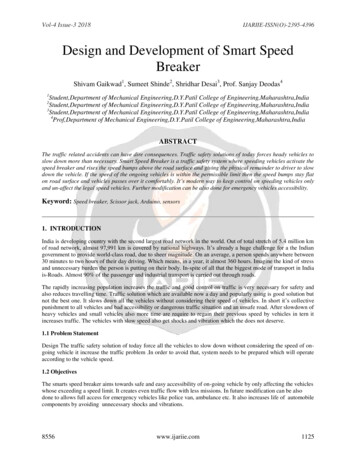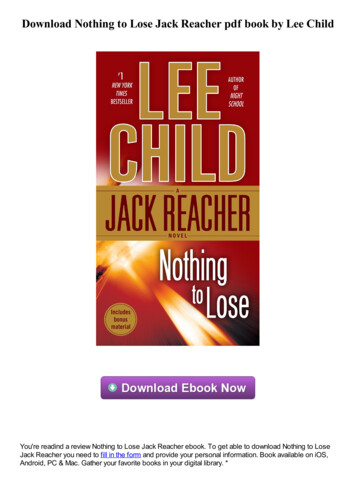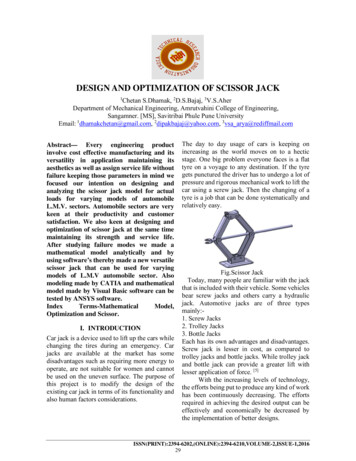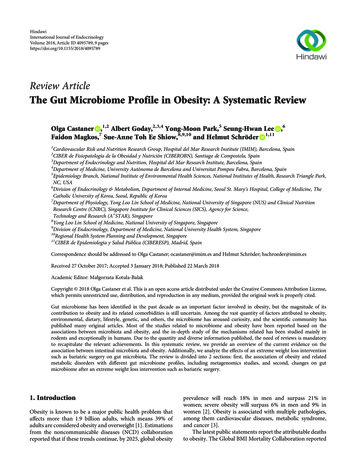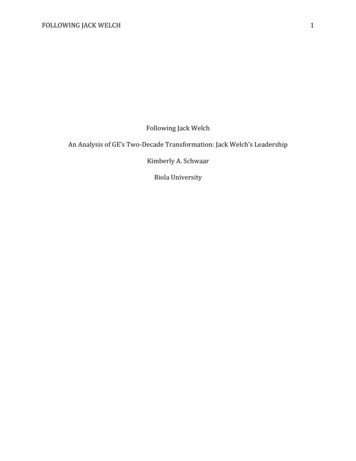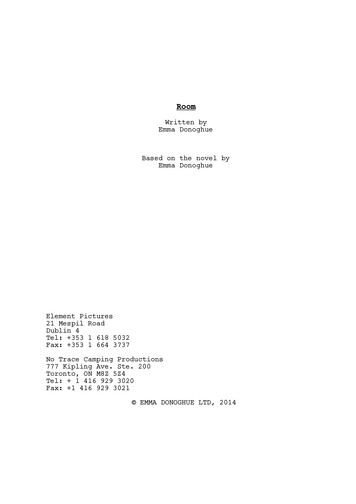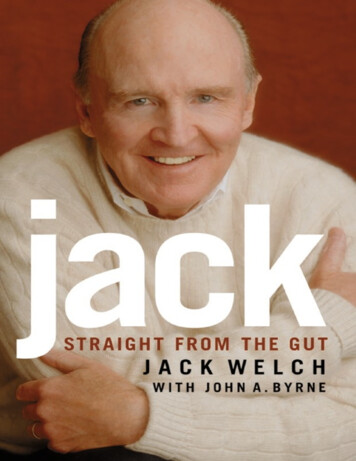
Transcription
ContentsAuthor’s NotePrologueSECTION I. EARLY YEARS1. Building Self-Confidence2. Getting Out of the Pile3. Blowing the Roof Off4. Flying Below the Radar5. Getting Closer to the Big Leagues6. Swimming in a Bigger PondSECTION II. BUILDING A PHILOSOPHY7. Dealing with Reality and “Superficial Congeniality”8. The Vision Thing
9. The Neutron Years10. The RCA Deal11. The People Factory12. Remaking Crotonville to Remake GE13. Boundaryless: Taking Ideas to the Bottom Line14. Deep DivesSECTION III. UPS AND DOWNS15. Too Full of Myself16. GE Capital: The Growth Engine17. Mixing NBC with Light Bulbs18. When to Fight, When to FoldSECTION IV. GAME CHANGERS19. Globalization20. Growing Services21. Six Sigma and Beyond22. E-BusinessSECTION V. LOOKING BACK, LOOKING FORWARD23. “Go Home, Mr. Welch”24. What This CEO Thing Is All About25. A Short Reflection on Golf
26. “New Guy”EpilogueAcknowledgmentsAfterwordAppendixes
PRAISE FORJACK: STRAIGHT FROM THE GUT“All CEOs want to emulate Jack Welch. They won’t be able to, but they’ll come closer if they listencarefully to what he has to say.”—Warren Buffett, chairman,Berkshire Hathaway“True confessions of a CEO . . . of interest to anyone who really cares about business.”—Newsday“Jack Welch gave team leadership new meaning as he took an industrial giant and turned it into anindustrial colossus with a heart and a soul and a brain.”—Michael D. Eisner, chairman and CEO,The Walt Disney Company“JACK: STRAIGHT FROM THE GUT is a good place to renew your faith in the success of freeenterprise.”—USA Today“Riveting . . . electric . . . one of the best business books of the year.”—BusinessWeek“Jack Welch, the brilliant business magician, has finally disclosed his mystery of management. Now wemust accept the generosity of his challenge and try to match or exceed him.”—Nobuyuki Idei, chairman and CEO,Sony Corporation“An American treasure, Jack Welch teaches us how a leader with keen intellect, guts, and honor can impartcourage to people around him, weather unexpected storms, inspire performance, and take an organization togreater and greater heights. His formula challenges all of us and any institution striving for excellence.”—Bernadine Healy, M.D., former president and CEO,American Red Cross
Copyright 2001 by John F. Welch, Jr. FoundationAfterword copyright 2003 by John F. Welch, Jr. Foundation All rights reserved.“My Dilemma—And How I Resolved It” by Jack Welch, reprinted from The Wall Street Journal 2002Dow Jones & Company, Inc. All rights reserved.Warner Business Books are published by Warner Books, Inc.,Hachette Book Group, 237 Park Avenue, New York, NY 10017, Visit our Web site atwww.HachetteBookGroup.com.An AOL Time Warner CompanyThe "Warner Books" name and logo are trademarks of Hachette Book Group, Inc.First eBook Edition: September 2001ISBN: 978-0-7595-0921-4
To the hundreds ofthousands of GE employeeswhose ideas and effortsmade this book possibleThe author’s profits from this book are being donated to charity.
Author’s NoteThis may seem a strange way to begin an autobiography. A confession: I hatehaving to use the first person. Nearly everything I’ve done in my life has beenaccomplished with other people. Yet when you write a book like this, you’reforced to use the narrative “I” when it’s really the “we” that counts.I wanted to mention the names of all the people who took this journey withme. My editors kept beating me up, trying to get the names out. We finallystruck a compromise. That’s why the acknowledgments in the back of the bookare somewhat long. Please remember that every time you see the word I in thesepages, it refers to all those colleagues and friends and some I might have missed.
PrologueI spent most of the Saturday morning after Thanksgiving 2000 waiting for the“New Guy.” That was the secret code for my successor, the future chairman andCEO of General Electric.On Friday night, the board had unanimously approved Jeff Immelt tosucceed me. I called him right away.“I have some good news. Can you and your family come to Floridatomorrow and spend the weekend?”Obviously, he knew what was going on. But we left it at that and wentquickly to the arrangements to get him to Florida.On Saturday morning, I could hardly wait to see him. The long CEOsuccession process was over. I was already outside when Jeff pulled into mydriveway. He had a big smile on his face and was barely out of the car before Ihad my arms around him, saying exactly what Reg Jones said to me 20 yearsearlier:“Congratulations, Mr. Chairman!”As we hugged, I felt we were closing the loop.In that moment, my memories took me straight back to the day when Regwalked into my Fairfield, Connecticut, office and embraced me, in just the same
way.Bear hugs, or any hugs, were not natural gestures for Reg. Yet here he waswith a smile on his face and his arms wrapped tightly around me. On thatDecember day in 1980, I was the happiest man in America and certainly theluckiest. If I could pick a job in business, this one would be it. It gave me anunbelievable array of businesses, from aircraft engines and power generators toplastics, medical, and financial services. What GE makes and does touchesvirtually everyone.Most important, it is a job that’s close to 75 percent about people and 25percent about other stuff. I worked with some of the smartest, most creative, andcompetitive people in the world—many a lot smarter than I was.When I joined GE in 1960, my horizons were modest. As a 24-year-oldjunior engineer fresh from a Ph.D. program, I was getting paid 10,500 a yearand wanted to make 30,000 by the time I was 30. That was my objective, if Ihad one. I was pouring everything I had into what I was doing and having ahelluva good time doing it. The promotions started coming, enough of them toraise my sights so that by the mid-1970s I began to think that maybe I could runthe place one day.The odds were against me. Many of my peers regarded me as the round pegin a square hole, too different for GE. I was brutally honest and outspoken. I wasimpatient and, to many, abrasive. My behavior wasn’t the norm, especially thefrequent parties at local bars to celebrate business victories, large or small.Fortunately, a lot of people at GE had the guts to like me. Reg Jones was oneof them.On the surface, we could not have been more different. Trim and dignified,he was born in Britain and had the bearing of a statesman. I had grown up just 16miles north of Boston, in Salem, Massachusetts, the only son of an IrishAmerican railroad conductor. Reg was reserved and formal. I was earthy, loud,and excitable, with a heavy Boston accent and an awkward stutter. At the time,Reg was the most admired businessman in America, an influential figure inWashington. I was unknown outside of GE, and inexperienced in policy issues.
Still, I always felt a vibration with Reg. He rarely revealed his feelings, neverproviding even a hint. Yet I had a feeling that he understood me. In some ways,we were kindred spirits. We respected each other’s differences and shared someimportant things. We both liked analysis and numbers and did our homework.We both loved GE. He knew it had to change, and he thought I had the passionand the smarts to do it.I’m not sure he knew how much I wanted GE to change—but his support forall I did over 20 years never wavered.The competition to succeed Reg had been brutal, complicated by heavypolitics and big egos, my own included. It was awful. At first, there were sevenof us from various parts of the company who were put in the spotlight by thevery public contest for Reg’s job. He hadn’t intended it to be the divisive andhighly politicized process that it turned out to be.I made a few mistakes in those years, none fatal. When Reg got the board toapprove me as his successor on December 19, 1980, I still wasn’t the mostobvious choice. Not long after the announcement was made, one of my GEfriends walked into the Hi-Ho, the local watering hole near headquarters, andoverheard one of the oldtime staffers repeating glumly into a martini, “I’ll givehim two years—then it’s Bellevue.”He missed by more than 20!Over all the years that I was chairman, I received widespread attention in themedia—both good and bad. But a lengthy cover story in Business Weekmagazine in early June 1998 prompted a flood of mail that inspired me to writethis book.Why? Because of the magazine article, literally hundreds of total strangerswrote me moving and inspirational letters about their careers. They described theorganizational pressures they felt to change as individuals, to conform tosomething or become someone they weren’t, in order to be successful. Theyliked the story’s contention that I never changed who I was. The story impliedthat I was able to get one of the world’s largest companies to come closer toacting like the crowd I grew up with.
Together with thousands of others, I tried to create the informality of a cornerneighborhood grocery store in the soul of a big company.The truth, of course, is more complex. In my early years, I tried desperatelyto be honest with myself, to fight the bureaucratic pomposity, even if it meantthat I wouldn’t succeed at GE. I also remember the tremendous pressure to besomeone I wasn’t. I sometimes played the game.At one of my earliest board meetings in San Francisco shortly after beingnamed vice chairman, I showed up in a perfectly pressed blue suit, with astarched white shirt and a crisp red tie. I chose my words carefully. I wanted toshow the board members that I was older and more mature than either my 43years or my reputation. I guess I wanted to look and act like a typical GE vicechairman.Paul Austin, a longtime GE director and chairman of the Coca-Cola Co.,came up to me at the cocktail party after the meeting.“Jack,” he said, touching my suit, “this isn’t you. You looked a lot betterwhen you were just being yourself.”Thank God Austin realized I was playing a role—and cared enough to tellme. Trying to be somebody I wasn’t could have been a disaster for me.Throughout my 41 years at GE, I’ve had many ups and downs. In the media,I’ve gone from prince to pig and back again. And I’ve been called many things.In the early days, when I worked in our fledging plastics group, some calledme a crazy, wild man. When I became CEO two decades ago, Wall Street asked,“Jack who?”When I tried to make GE more competitive by cutting back our workforce inthe early 1980s, the media dubbed me “Neutron Jack.” When they learned wewere focused on values and culture at GE, people asked if “Jack has gone soft.”I’ve been No. 1 or No. 2 Jack, Services Jack, Global Jack, and, in more recentyears, Six Sigma Jack and e-Business Jack.When we made an effort to acquire Honeywell in October 2000, and I agreedto stay on through the transition, some thought of me as the Long-in-the-Tooth
Jack hanging on by his fingertips to his CEO job.Those characterizations said less about me and a lot more about the phasesour company went through. Truth is, down deep, I’ve never really changed muchfrom the boy my mother raised in Salem, Massachusetts.When I started on this journey in 1981, standing before Wall Street analystsfor the first time at New York’s Pierre Hotel, I said I wanted GE to become “themost competitive enterprise on earth.” My objective was to put a small-companyspirit in a big-company body, to build an organization out of an old-lineindustrial company that would be more high-spirited, more adaptable, and moreagile than companies that are one-fiftieth our size. I said then that I wanted tocreate a company “where people dare to try new things—where people feelassured in knowing that only the limits of their creativity and drive, their ownstandards of personal excellence, will be the ceiling on how far and how fastthey move.”I’ve put my mind, my heart, and my gut into that journey every day of the40-plus years I’ve been lucky enough to be a part of GE. This book is an effortto bring you along on that trip. In the end, I believe we created the greatestpeople factory in the world, a learning enterprise, with a boundaryless culture.But you judge for yourself whether we ever reached the destination Idescribed in my “vision” speech at the Pierre in 1981.This is no perfect business story. I believe that business is a lot like a worldclass restaurant. When you peek behind the kitchen doors, the food never looksas good as when it comes to your table on fine china perfectly garnished.Business is messy and chaotic. In our kitchen, I hope you’ll find something thatmight be helpful to you in reaching your own dreams.There’s no gospel or management handbook here. There is a philosophy thatcame out of my journey. I stuck to some pretty basic ideas that worked for me,integrity being the biggest one. I’ve always believed in a simple and directapproach. This book attempts to show what an organization, and each of us, canlearn from opening the mind to ideas from anywhere.I’ve learned that mistakes can often be as good a teacher as success.
There is no straight line to anyone’s vision or dream. I’m living proof of that.This is the story of a lucky man, an unscripted, uncorporate type who managedto stumble and still move forward, to survive and even thrive in one of theworld’s most celebrated corporations. Yet it’s also a small-town American story.I’ve never stopped being aware of my roots even as my eyes opened to see aworld I never knew existed.Mostly, though, this is a story of what others have done—thousands of smart,self-confident, and energized employees who taught each other how to break themolds of the old industrial world and work toward a new hybrid ofmanufacturing, services, and technology.Their efforts and their success are what have made my journey so rewarding.I was lucky to play a part because Reg Jones came into my office 21 years agoand gave me the hug of a lifetime.
SECTIONEARLY YEARSI
1Building Self-ConfidenceIt was the final hockey game of a lousy season. We had won the first threegames in my senior year at Salem High School, beating Danvers, Revere, andMarblehead, but had then lost the next half dozen games, five of them by asingle goal. So we badly wanted to win this last one at the Lynn Arena againstour archrival Beverly High. As co-captain of the team, the Salem Witches, I hadscored a couple of goals, and we were feeling pretty good about our chances.It was a good game, pushed into overtime at 2–2.But very quickly, the other team scored and we lost again, for the seventhtime in a row. In a fit of frustration, I flung my hockey stick across the ice of thearena, skated after it, and headed back to the locker room. The team was alreadythere, taking off their skates and uniforms. All of a sudden, the door opened andmy Irish mother strode in.The place fell silent. Every eye was glued on this middle-aged woman in afloral-patterned dress as she walked across the floor, past the wooden bencheswhere some of the guys were already changing. She went right for me, grabbingthe top of my uniform.
“You punk!” she shouted in my face. “If you don’t know how to lose, you’llnever know how to win. If you don’t know this, you shouldn’t be playing.”I was mortified—in front of my friends—but what she said never left me.The passion, the energy, the disappointment, and the love she demonstrated bypushing her way into that locker room was my mom. She was the mostinfluential person in my life. Grace Welch taught me the value of competition,just as she taught me the pleasure of winning and the need to take defeat instride.If I have any leadership style, a way of getting the best out of people, I owe itto her. Tough and aggressive, warm and generous, she was a great judge ofcharacter. She always had opinions of the people she met. She could “smell aphony a mile away.”She was extremely compassionate and generous to friends. If a relative orneighbor visited the house and complimented her on the water glasses in thebreakfront, she wouldn’t hesitate to give them away.On the other hand, if you crossed her, watch out. She could hold a grudgeagainst anyone who betrayed her trust. I could just as easily be describingmyself.And many of my basic management beliefs—things like competing hard towin, facing reality, motivating people by alternately hugging and kicking them,setting stretch goals, and relentlessly following up on people to make sure thingsget done—can be traced to her as well. The insights she drilled into me neverfaded. She always insisted on facing the facts of a situation. One of her favoriteexpressions was “Don’t kid yourself. That’s the way it is.”“If you don’t study,” she often warned, “you’ll be nothing. Absolutelynothing. There are no shortcuts. Don’t kid yourself!”Those are blunt, unyielding admonitions that ring in my head every day.Whenever I try to delude myself that a deal or business problem willmiraculously improve, her words set me straight.From my earliest years in school, she taught me the need to excel. She knew
how to be tough with me, but also how to hug and kiss. She made sure I knewhow wanted and loved I was. I’d come home with four As and a B on my reportcard, and my mother would want to know why I got the B. But she would alwaysend the conversation congratulating and hugging me for the As.She checked constantly to see if I did my homework, in much the same waythat I continually follow up at work today. I can remember sitting in my upstairsbedroom, working away on the day’s homework, only to hear her voice risingfrom the living room: “Have you done it yet? You better not come down untilyou’ve finished!”But it was over the kitchen table, playing gin rummy with her, that I learnedthe fun and joy of competition. I remember racing across the street from theschoolyard for lunch when I was in the first grade, itching for the chance to playgin rummy with her. When she beat me, which was often, she’d put the winningcards on the table and shout, “Gin!” I’d get so mad, but I couldn’t wait to comehome again and get the chance to beat her.That was probably the start of my competitiveness, on the baseball diamond,the hockey rink, the golf course, and business.Perhaps the greatest single gift she gave me was self-confidence. It’s whatI’ve looked for and tried to build in every executive who has ever worked withme. Confidence gives you courage and extends your reach. It lets you takegreater risks and achieve far more than you ever thought possible. Building selfconfidence in others is a huge part of leadership. It comes from providingopportunities and challenges for people to do things they never imagined theycould do—rewarding them after each success in every way possible.My mother never managed people, but she knew all about building selfesteem. I grew up with a speech impediment, a stammer that wouldn’t go away.Sometimes it led to comical, if not embarrassing, incidents. In college, I oftenordered a tuna fish on white toast on Fridays when Catholics in those dayscouldn’t eat meat. Inevitably, the waitress would return with not one but a pair ofsandwiches, having heard my order as “tu-tuna sandwiches.”My mother served up the perfect excuse for my stuttering. “It’s becauseyou’re so smart,” she would tell me. “No one’s tongue could keep up with a
brain like yours.” For years, in fact, I never worried about my stammer. Ibelieved what she told me: that my mind worked faster than my mouth.I didn’t understand for many years just how much confidence she pouredinto me. Decades later, when looking at early pictures of me on my sports teams,I was amazed to see that almost always I was the shortest and smallest kid in thepicture. In grade school, where I played guard on the basketball squad, I wasalmost three-quarters the size of several of the other players.Yet I never knew it or felt it. Today, I look at those pictures and laugh at whata little shrimp I was. It’s just ridiculous that I wasn’t more conscious of my size.That tells you what a mother can do for you. She gave me that much confidence.She convinced me that I could be anyone I wanted to be. It was really up to me.“You just have to go for it,” she would say.My relationship with my mother was powerful and unique, warm andreinforcing. She was my confidante, my best friend. I think it was that waypartly because I was an only child, born to her late in life (for those days), whenshe was 36 and my dad was 41. My parents had tried unsuccessfully to havechildren for many years. So when I finally arrived in Peabody, Massachusetts, onNovember 19, 1935, my mother poured her love into me as if I were a foundtreasure.I wasn’t born with a silver spoon. I had something better—tons of love. Mygrandparents on both sides were Irish immigrants, and neither they nor myparents graduated from high school. I was nine when my parents bought our firsthouse, a modest two-story masonry home on 15 Lovett Street, in an Irishworking-class section of Salem, Massachusetts.The house was across the street from a small factory. My father would oftenremind me that was a real plus. “You always want a factory for a neighbor.They’re not around on the weekends. They don’t bother you. They’re quiet.” Ibelieved him, never recognizing that he was engaging in some confidencebuilding himself.My dad worked hard as a railroad conductor on the Boston & Mainecommuter line between Boston and Newburyport. When “Big Jack” went off inthe early morning at five in his pressed dark blue uniform, his white shirt
starched to perfection by my mother, he looked like he could salute God himself.Nearly every day was the same, a ticket-punching journey through the same tendepots, over and over again: Newburyport, Ipswich, Hamilton/Wenham, NorthBeverly, Beverly, Salem, Swampscott, Lynn, the General Electric Works,Boston. And then back again, over some 40 miles of track. Later, I would get akick out of knowing that one of his regular stops was at GE’s aircraft engines’complex in Lynn, just outside Boston.Every workday, he looked forward to climbing back on the B&M train thathe always thought of as his own. My father loved greeting the public andmeeting interesting people. He moved through the center aisles of thosepassenger cars like an ambassador, with good humor, punching tickets andwelcoming the familiar faces in the bench seats as if they were close friends.During every rush hour, he traded smiles and hellos with passengers andspread a good bit of Irish blarney. His cheerful disposition on the train wouldoften contrast with his quiet and withdrawn behavior at home. This would annoymy mother, who would complain, “Why don’t you bring some of that baloneyyou pass out on the train home?” He seldom did.My father was a diligent worker who put in long hours and never missed aday of work. If he got a bad weather report, he’d ask my mother to drive him tothe station the night before. He would sleep in one of the cars on his train, sohe’d be ready to go in the morning.Rarely would he get home before seven at night, always picked up at thestation in the family car by my mother. He’d come home with a bundle ofnewspapers under his arm, all of them left by his passengers on the train. Fromthe age of six, I got my daily dose of current events and sports, thanks to theleftover Boston Globes, Heralds, and Records. Reading the papers every nightbecame a lifelong addiction. I’m a news junkie to this day.My father not only got me started on knowing what was going on outsideSalem, he also taught me, through example, the value of hard work. And he didsomething else that would last a lifetime—he introduced me to golf. My fathertold me that the big shots on his train were always talking about their golfgames. He thought I ought to learn about this instead of the baseball, football,and hockey I was playing. Caddying was something the older kids in the
neighborhood were doing. So with his push, I started early, caddying at the ageof nine at the nearby Kernwood Country Club.I was incredibly dependent on my parents. Many times, when my mother leftthe house to pick up my dad, the train would be late. When I was 12 or 13, thedelays would drive me crazy. I’d run out of the house and down Lovett Street,my heart racing, to see if they were around the corner on the way home, out offear that something had happened to them. I just couldn’t lose them. They weremy world.It was a fear I shouldn’t have had, because my mother raised me to be strong,tough, and independent. She always feared she would die young, a victim of theheart disease that struck down everyone in her family. So in my early teens, mymother encouraged me to be independent. She’d push me to take trips to Bostonon my own to see a ball game or catch a movie. I thought I was cool in thosedays until my mother left the house to pick up my dad at the train depot and theywere late coming home.Salem was a great place for a boy to grow up. It was a town with a strongwork ethic and good values. In those days, no one locked their doors. OnSaturdays, parents didn’t worry when their kids walked downtown to theParamount, where a quarter bought you two movies and a box of popcorn, andyou still had enough left for an ice cream on the way home. On Sundays, thechurches were filled.Salem was a scrappy and competitive place. I was competitive, and myfriends were, too. All of us were jocks, living to play one sport or another. We’dorganize our own neighborhood baseball, basketball, football, and hockeygames, playing at the Pit, a dusty piece of flat land surrounded by trees andbackyards off North Street. We’d sweep the gravel flat in the spring and summer,choose up sides and teams, even schedule our own tournaments. We’d play fromearly in the morning until the town whistle blew at quarter to nine. The whistlewas the signal to get home.In those days, the city was broken up into neighborhood schools, which ledto intense rivalries in every sport—even at the primary school level. I was thequarterback on the six-man Pickering Grammar School football team. I waspathetically slow, but I had a pretty good arm and a pair of teammates who could
really run. We won the championship at Pickering. I also was the pitcher on ourbaseball team and learned to throw a sweeping curveball and a sharp drop.At Salem High School, however, I found out that I peaked very early in bothfootball and baseball. I was too slow to play football, and my devastating curveand drop at 12 didn’t come with any more break at 16. My fastball couldn’tcrack a pane of glass. Hitters would just sit there and wait for it. I went frombeing a starting pitcher as a freshman to the bench as a senior. I was lucky to bean okay jock in hockey, as captain and leading scorer of the high school team,but in college my lack of speed got me again. I had to give it up.Thank goodness for golf, a sport that doesn’t demand speed. It was myfather’s early encouragement that led me to Kernwood Country Club, where Ibegan to caddy. On Saturday mornings, my friends and I would sit on the curboutside the gate to Green Lawn Cemetery, waiting for a member of the golf clubto pick us up in his car and bring us a few miles to the course. On the hottestsummer days, we’d sneak off to a secluded spot we called “Black Rock,” stripnaked, and cool off with a swim in the Danvers River.Mostly, though, we’d sit on the grassy hill by the caddy shack and wait for“Swank” Sweeney, the caddy master, to shout our names. A tall, thin man withcurly hair and glasses, Sweeney would take the bags out of the caddy shack, putthem on a half door, and yell, “Welch!” I’d rush off from a game of cards or awrestling match for my assignment.Nearly everyone hoped to carry Ray Brady’s clubs because he was the bigtipper on the course, where tips were generally scarce. Otherwise, the 1.50 feefor a single 18 holes was about all you saw. We really worked for Mondaymornings, when the grounds crew fixed the course. That was caddies’ morning,when we would take the lost balls we found and use our taped-up clubs to play18 holes. We’d get there at the crack of dawn because they threw us off promptlyat noon.Caddying gave me the chance to make some money and, more important,learn the game. I also got early exposure to people who had achieved some levelof success. I got a very early look at how attractive or how big a jackasssomeone can be by watching their behavior on a golf course.
Besides caddying, I worked a number of jobs. For a while, I delivered theSalem Evening News. I worked at the local post office during the holiday season.For about three years, I sold shoes on commission at the Thom McCan store onEssex Street. We got seven cents a pair for selling regular shoes. If you sold the“turkeys,” the 11E wingtips with the purple toes and the white trim, you’d get aquarter or fifty cents. I’d always bring them out, fit them to a pair of stinky feet,and say, “These look good on you.” What I’d say for an extra quarter in thosedays!One summer job really taught me a lesson. It convinced me what I didn’twant to do. I was operating a drill press at the Parker Brothers game plant inSalem. My job was to take a small piece of cork, drill a hole through it bypushing down a pedal with my foot, and then toss the cork into a big roundcardboard drum. Every day, I did thousands of them.To pass the time, I’d play a game by trying to cover the bottom of the barrelwith corks I drilled before the foreman came along to empty it out. I rarely madeit. Talk about frustration. I’d go home with headaches. I hated it. I didn’t lastthree weeks, but it taught me a lot.My early years were spent with my nose pressed up against the glass. Everysummer before I was old enough to work, the kids from the Salem playgroundtook a special train to Old Orchard Beach, an amusement park in Maine. Thiswas our summer highlight. We’d board the train at six-thirty . . and arrive theretwo hours later. Within a couple of hours, by running from ride to
"Jack Welch gave team leadership new meaning as he took an industrial giant and turned it into an industrial colossus with a heart and a soul and a brain." —Michael D. Eisner, chairman and CEO, The Walt Disney Company "JACK: STRAIGHT FROM THE GUT is a good place to renew your faith in the success of free enterprise." —USA Today
